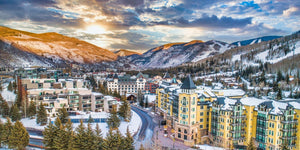Can You Get Altitude Sickness In Breckenridge?

Are you about to visit Breckenridge for skiing or vacation and need to know: can you get altitude sickness in Breckenridge? If you are, then you've come to the right spot for some answers. We'll go over the symptoms, causes and how to avoid altitude sickness in Breckenridge Colorado.
Breckenridge Colorado Altitude
Breckenridge is known for its beautiful landscape and amazing ski resorts, but it is also known for its high altitude. Breckenridge, Colorado elevation is 9,600 feet above sea level. This makes it one of the highest towns in the United States.
- Breckenridge altitude - 9,600 ft (2,900 m)
- Breckenridge Ski Resort summit altitude - 12,998 ft (3962 m)
In addition, at the Breckenridge Ski Resort the summit is 12,998 feet high, exceeding even Copper Mountain. Whether skiing, hiking or visiting in general, these are some very high altitudes to adjust to.
Can You Get Altitude Sickness In Breckenridge?
So can you get altitude sickness in Breckenridge? Yes.
If you are planning on visiting the high country anytime soon, it is important to recognize the symptoms and treatment for altitude sickness. This condition can affect anyone but is most common in people who have not spent much time at higher altitudes before. While it is not a serious medical condition, altitude sickness can be uncomfortable and make your time in the mountains unpleasant if left untreated.
The full name of this condition is acute mountain sickness (AMS) and it occurs when your body struggles to adapt to higher elevations. Because of the way air pressure works, there is less oxygen at higher altitudes like in Breckenridge. Your body has to work harder to make up for this lack of oxygen. Altitude sickness can occur when you go above 8,000 feet and may result in headaches and/or nausea. It can also cause fatigue, difficulty breathing, dizziness and trouble sleeping.
Altitude sickness prevention is the safest bet, so it's best to follow the steps below to avoid altitude sickness Breckenridge Colorado.
3 Ways How To Avoid Altitude Sickness In Breckenridge
If you want to know how to avoid altitude sickness in Breckenridge or how to avoid altitude sickness while skiing, follow the three steps below. Although these steps can also help relieve altitude sickness, preventing altitude sickness is easier than trying to fight it once it kicks in.
1. Hydrate Yourself
You may already know that when you are hiking, or even just drinking at the bar, it is important to stay hydrated. At high altitude, however, hydration is even more important. The lower oxygen level and thinner atmosphere in Breckenridge means that your body has to work harder to breathe and may dehydrate you faster than normal. Staying hydrated will help your body adjust more easily and will reduce altitude sickness symptoms.
The best thing you can do is to drink at least a half of an ounce of water per pound of your body weight each day. That equates to about 6-8 glasses of water for the average adult. Of course, if you are engaging in high-altitude activities like skiing or snowboarding, you will want to drink even more than this.
To boost your hydration, take Zaca's
hydration packets along with water to maximize and enhance water absorption.
2. Take Time To Acclimate
One of the best ways to avoid altitude sickness is to take time to acclimate until your body adjusts to the lower levels of oxygen available at high altitudes. If you are arriving from sea level, plan on spending the first day in Denver relaxing and not exerting yourself too much before proceeding to Breckenridge.
Once you arrive in Breckenridge, take it easy for at least a day until your body adjusts to the higher elevation. Avoid hiking or skiing too many vertical feet on day one. As long as you take it easy for the first day and make smart decisions about how high you go, you should be able to enjoy Breckenridge with lessened altitude sickness problems.
3. Take Supplements For Altitude Sickness
Two ingredients that have been proven to combat altitude sickness:
-
Glutathione, which is a key amino acid and antioxidant in the body, is shown to drop in levels in response to high altitude. Supplementing it may help replenish glutathione levels and fight free radical damage to combat altitude sickness.
-
Dihydromyricetin was shown in a a 2014 study to improve high altitude performance.² To charge your body up to combat altitude stress, take Dihydromyricetin before and during your Breckenridge trip.

Sold throughout Colorado, Zaca chewables are small, berry flavored tablets that can help you feel better while you're at high altitude. Packed with nutrients including both science-backed Glutathione and Dihydromyricetin
, these help you have the best experience by enhancing hydration, boosting your antioxidants, and improving overall performance.
Try Zaca's chewable tablets today so your body can best respond to the physical stress of high altitude conditions!
SOURCES:
1. Effect of high altitude (7,620 m) exposure on glutathione
https://pubmed.ncbi.nlm.nih.gov/11320641/
2. Dihydromyricetin Improves Physical Performance under Simulated High Altitude
https://journals.lww.com/acsm-msse/fulltext/2014/11000/Dihydromyricetin_Improves_Physical_Performance.6.aspx
3. Breckenridge Elevation
https://en.wikipedia.org/wiki/Breckenridge,_Colorado
4. Breckenridge Ski Resort Elevation
https://en.wikipedia.org/wiki/Breckenridge_Ski_Resort

